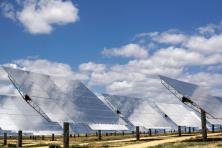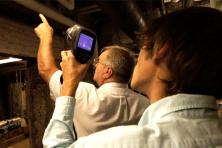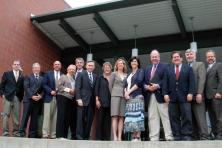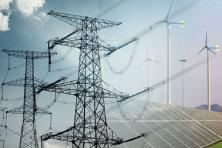As the United States climbs out of the Great Recession, one source of economic promise is the hard work that American cities are doing to catalyze local clean energy economic development, according to Powering the New Energy Future from the Ground Up, a report released on July 18, 2012 by New Energy Cities.
The study, conducted over a 10-month period, profiles a diverse set of 34 communities with populations under 250,000 and found that U.S. communities from Knoxville, TN to Fort Collins, CO are pioneering a wide range of clean energy solutions in energy efficiency, renewable energy, electric vehicles, and carbon-reducing transportation strategies.
The communities profiled in this report demonstrate that clean energy innovation is occurring across the country. Through trial and error, communities are breaking down barriers, testing various marketing strategies to drive demand for clean energy solutions, and creating finance mechanisms that can serve as models for other communities.
Powering the New Energy Future from the Ground Up profiles the early results of a diverse range of small- and medium-sized cities with different economic and energy profiles that have stepped up to the plate, committing staff time and expertise to develop partnerships with utilities, private entities, and community groups to advance the use of energy efficiency, renewable energy, electrified transportation, commute trip reduction, and smart grid integration.
The sources of funding for these efforts were diverse. Many cities used federal grants, including funds issued under the American Recovery and Reinvestment Act, to jumpstart long-term strategies for clean energy and energy efficiency. Others, such as Babylon, New York, developed innovative financing strategies in the absence of grant money altogether.
These communities on the front lines of clean energy innovation are laying the groundwork for the clean energy economy, setting up sustainable business models to survive after federal grants sunset and developing long-term relationships with workforce development institutions to create high-quality, living-wage jobs. The future of these city-led efforts will become all the more important to watch as federal grants sunset, and if the US Congress continues to avoid passing a comprehensive energy or climate policy.
The Seattle, WA-based Henry M. Jackson funded Powering the New Energy Future from the Ground Up to showcase examples of city-led clean energy innovation so that other cities throughout the country might learn from and emulate these pioneers.
“On the centennial anniversary of Senator Henry Jackson’s birth, we face a new set of environmental challenges, in particular the threat of global climate change and the difficulty of achieving economic prosperity without posing a threat to future generations,” said Craig Gannett, Vice President of the Henry M. Jackson Foundation. “We hope that these examples of clean energy innovation will inform and inspire other cities throughout the country.”
Communities profiled in the report: Babylon, NY; Bainbridge Island, WA; Bellingham, WA; Boulder, CO; Eugene, OR; Ft. Collins, CO; Hailey, ID; Jackson, WY; Knoxville, TN; and Oberlin, OH.
Communities with projects featured in the report: Bedford, NY; Bremerton, WA; Burlington, VT; Gainesville, FL; Hillsboro, OR; Issaquah, WA; Madison, WI; Pendleton, OR; Salt Lake City, UT; Sante Fe, NM; West Union, IA; and Williamson, WV.
Communities with projects to watch for future results: Aiken, SC; Charleston, SC; Columbia, MO; Corvallis, OR; Dubuque, IA; El Cerrito, Albany, Piedmont and San Pablo, CA; Grand Rapids, MI; Greenfield, MA; Keene, NH; Little Rock, AR; Palo Alto, CA; and Richmond, CA.
To download the report, please go here.



